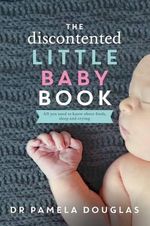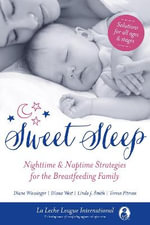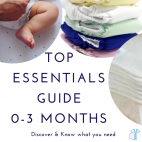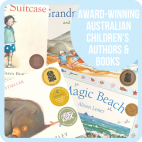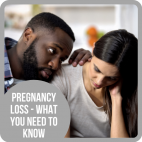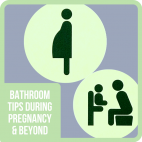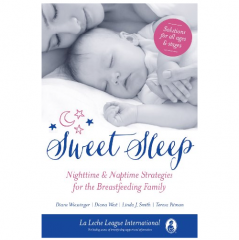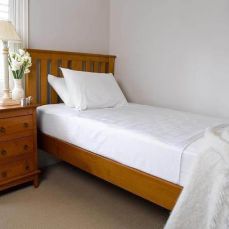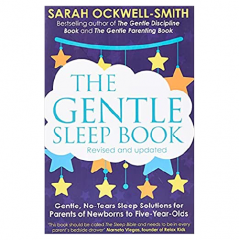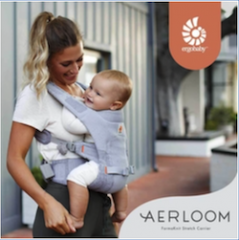Where to go for gentle baby sleep advice Sleep Suitable for stages: Pregnancy, 0 - 3 Months, 3 - 6 Months, 6 - 12 Months, 12 - 18 Months, 18 - 24 Months
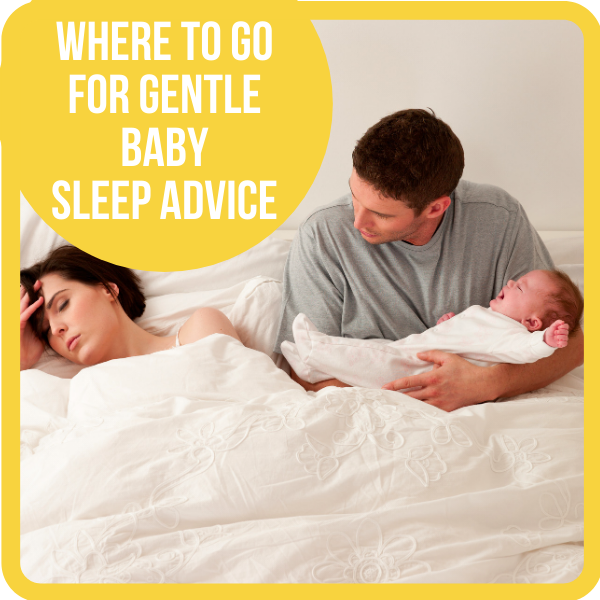

Last updated 21 Nov 2022
Sleep…no new parent seems to be able to get enough of it...everyone wants to bring it up with new parents. Even strangers can’t help but ask how 'good' your baby is ('good' meaning they are sleeping and settled).
It's funny because babies will, well... sleep like babies, and really, are there any 'bad' babies.
In the first months, you are getting to know your baby and their sleep habits.
It's easy to get hung up on comparing your baby's sleep with other babies or with books. It can lead to the insecurity that either there’s something wrong with your baby or you are doing it wrong. Quoted sleep times and nap averages are just averages and should be a guide, not a rule.
Sleep varies from baby to baby and at different times of development. Some babies have difficulty getting to sleep but will stay asleep. Others will easily fall asleep but won’t stay asleep. Others never want to go or stay asleep - much to parents’ frustration.
For parents, it can save a lot of time and anxiety to learn about both the biology of sleep and what soothing strategies they can try with their baby. It can also serve to ease frustrations when expectations and reality are closely related.
The Biology of sleep:
-
Newborns aren’t independently capable of knowing night from day due to an immature body clock (which is the body’s response to light). This ‘circadian rhythm’ starts to develop in the first few months, is noticed from around 3 months and continues to develop over the first years.
-
Nighttime breast milk contains hormones (melatonin and tryptophan). These hormones help the baby fall asleep and learn the difference between day and night.
-
There are huge differences between adult and newborn sleep.
-
Adults cycle through 4 stages of sleep over 90 to 120 mins spending about 20-25% of the sleep time in Rapid Eye Movement or REM sleep.
-
REM sleep peaks when babies are in the womb and gradually reduces over their lifespan. REM sleep is when the brain is active in building, developing, & consolidating.
-
Babies up to 9 months old have shorter sleep cycles at around 50 mins and spend about 50% of the time in REM sleep (active sleep).
-
When not asleep, newborns have short periods of active alert time and periods of quiet alert time. As they grow, the periods of alert time increase, and sleep needs decrease.
-
-
Babies can and will let you know what they need by communicating using their body and their voice. For example, they will start with subtle tired signs/cues such as rubbing their eyes. These cues will escalate to crying and bodily tension if the parent isn’t paying close attention and responding.
-
Tiny babies have tiny stomachs, so they will need and wake up for feeds through the night. Even after their stomachs grow, it is still ‘normal’ for babies and small children to wake through the night for many reasons.
Common areas to consider around sleep:
There are so many factors that influence sleep that many people have written books about it. In The top 10 questions to ask yourself so everyone can sleep blog, we explore what we have learnt from reading numerous books and resources on the topic. We look at the following questions in detail:
1. What is biologically normal sleep?
2. How can you balance your needs with your baby's needs?
3. What activities during the day contribute to good sleep?
4. Are there physical health-related reasons for disrupted sleep?
5. Are there cognitive/emotional related reasons for disrupted sleep?
6. Are Sleep routines important?
7. How are safe and conducive sleeping environments created?
8. What strategies can be used for helping baby settle and fall asleep?
10. How will my baby’s needs change over time?
When sleep becomes a battle between parent and baby
Without help and appropriate advice, the need for sleep can become a desperate situation for parents. This has led to a big business around sleep products, sleep books, sleep courses, and sleep consultants. For the barely functioning sleep deprived, this can be a confusing space to figure out the genuine from the gimmicks.
Some books, sleep consultants and health professionals take a parent-centric approach and advocate sleep training where you teach your baby to sleep by leaving them to learn how to ‘self-settle’. This is advocated for various ages but usually not before 12 weeks. There are various names for this practice and strategies that (usually desperate and sleep-deprived) parents are encouraged to try. These usually involve several days of the baby crying themselves to sleep whilst the parent is nearby trying to fight their urge to comfort their baby. This can be traumatic for everyone involved. Eventually, the baby learns that no one is coming to comfort them during sleep or nap times and gives up attempts to communicate by crying. The theory goes that everyone gets more sleep, which is critical for the baby to develop normally and for parents to function. So the end justifies the means. There are a few problems with the theory because studies that measure the child’s sleep times don’t usually find they sleep more, but they do find that parents perceive that baby sleeps more. The problem is that the baby will often appear to be sleep trained but will regress, and the whole thing needs to be repeated. I have included various resources below for a more in-depth analysis of the various sleep training practices and theories.
When parents can work together with their babies
Alternatively, there are many great resources out there for parents who want to take a gentler, more respectful and empathetic approach. They focus on daytime and pre-sleep routines (rather than schedules), adjusting the sleep environment, having proximity between the mother and baby at night, and settling strategies, including breastfeeding and close contact in response to your baby. All these strategies aim to reduce stress, crying, and struggling. They honour the mother’s instinct to comfort and support her baby around sleep. They also acknowledge that babies’ needs will change and evolve as they develop. The parent then changes their approach to supporting sleep over time.
The research around sleep or extinction training is complex, and you could probably find a study to support any argument. Be wary of books that don’t explore the long-term effects of infant development (especially psychological), breastfeeding outcomes, the parent-child relationship or norms from other cultures worldwide.
Sleep-related online resources and literature:
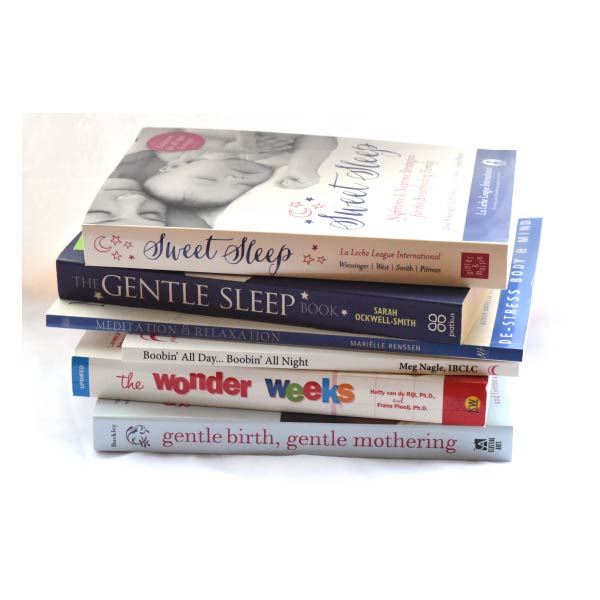
Evolutionary Parenting
http://evolutionaryparenting.com
Written by Tracy Cassels, PhD, she explores parenting philosophy based on “biology, history, history, neuroscience, anthropology, and developmental psychology”. It is about making decisions from a basis of understanding and integrating the research. She makes the research accessible to everyday parents with a particular focus on sleep and baby ‘experts’. She has developed many articles, a ‘Brief Infant and Toddler Sleep Screening’ (BITSS) tool, some books, some online courses, individualised parenting help, and a YouTube Channel.
Sarah Ockwell-Smith
https://sarahockwell-smith.com
Sarah Ockwell-Smith is a mother of 4, a parenting author, writer and coach with a particular interest in child sleep. She studied Psychology specialising in child development, then trained as an antenatal teacher, Hypnotherapist/Psychotherapist, Developmental Infant Massage Instructor and Birth and Postnatal Doula. She is a member of the British Sleep Society and is also the co-founder of www.gentleparenting.co.uk.
She has many blog articles on her website on all sorts of parenting topics. Sarah Ockwell-Smith's articles mentioning sleep can be found here.
Pamela Douglas & Possums Online
https://pameladouglas.com.au/or https://possumsonline.com/
Dr Pamela Douglas is an Australian-based GP, IBCLC, and researcher. She runs the Possums Clinic which operates out of the Possums Education and Research Centre based in Brisbane and collaborates with multiple universities, including The University of Queensland. She has developed the Neuroprotective Developmental Care (NDC or the Possums programs). For breastfeeding support, they offer a self-help program known as the Gestalt Breastfeeding approach. The Possums website offers free Mental Health strategies for parents based on the Acceptance and Commitment Therapy (ACT) approach. They offer parent programs online and face-to-face and online consultations delivered at the lowest cost possible based on their not-for-profit model as a registered health promotion charity. Her work focuses on the main issues that parents face, feeding, sleeping and the mother’s mental health.
La Leche League International
La Leche League International states that its “Mission is to help mothers worldwide to breastfeed through mother-to-mother support, encouragement, information, and education, and promote a better understanding of breastfeeding as an important element in the healthy development of the baby and mother”. Their breastfeeding info section has sleep-related articles, including: 'Sleep: Bedshare', 'safe sleep', 'safe surface checklist', 'talking with your doctor about bedsharing'; & 'sleep training…or not'. All this information and more can be found in their book Sweet Sleep which comes highly recommended by breastfeeding mothers and Lactation Consultants.
Professor James J. McKenna
The Mother-Baby Behavioral Sleep Laboratory at the University of Notre Dame’s website. This has Professor James J. McKenna’s research, safe cosleeping guidelines, discusses the controversy around bedsharing, and provides resources for parents in video, audio and text formats.
Pinky McKay
Pinky McKay is a grandmother and mother of 5, breastfeeding expert, International Board Certified Lactation Consultant (IBCLC), author, and speaker. She has a whole category of blogs dedicated to sleep. All 4 of her books are great, but Sleeping Like a Baby helps set realistic expectations, following your baby’s cues and containing settling techniques to try with your baby. Pinky’s mantra for parents is to ask “Is it safe? Is it respectful? Does it feel right?”. Usually, these questions are enough to direct the parents towards acting (or not acting) in a way that respects and supports the baby and the parent’s relationship.
Dr Sears family
America's foremost baby and childcare experts. The Sears family has learned from decades of pediatric practice, bolstered by their parenting experiences.
Dr Harvey Karp
From regular moms and dads to Hollywood superstars, thousands of parents have come to baby expert Dr Harvey Karp to learn his remarkable techniques for soothing babies and increasing sleep.
Elizabeth Pantley
Elizabeth Pantley a world-renowned expert on children's sleep and an experienced mother of four. She has travelled the world speaking and writing about the challenges parents face, providing positive, effective, practical solutions that have improved millions of families lives.
The wonder weeks
This is not a sleep book but does provide reassurance through the times when your baby goes through a developmental ‘leap’ and suddenly seems more clingy and changes sleeping and feeding patterns. This helps parents see the silver lining of fussy behaviour as a necessary and normal part of a baby mastering new skills and perceiving the world in a new way. This behaviour is temporary, and there are things parents can do to help their babies through. Pair the book with the free mobile app to always be prepared and fascinated as your baby develops over the first 20 months.
Dr Margot Sunderland
http://www.margotsunderland.org
Dr Margot Sunderland is a Child Psychotherapist and is involved with numerous training centres and institutes. She speaks as a parenting expert and has authored over 20 books in the field of child mental health, with her best-known book, “The Science of Parenting” which explores the effects of adult-child interaction on the child’s developing brain. The more up-to-date version of her original book is “What Every Parent Needs to Know: Love, nurture and play with your child”, which is a good introduction to general parenting topics related to brain science. Within the book is a 20-page chapter on ‘Sleep and bedtimes’, which introduces how sleep relates to other areas of parenting.
The Milk Meg
Meg Nagle is an International Board Certified Lactation Consultant (IBCLC) in private practice on the Sunshine Coast QLD. She has a popular blog, website and SM following. She is a spokesperson for natural term breastfeeding and loves to dispel breastfeeding myths. Since breastfeeding and sleep are so closely linked, her book Boobin' all day Boobin all night which explores gentle approaches to sleep for breastfeeding families, deserves mention.
Anni Gethin & Beth Macgregor's Book
Child development specialists and mothers have written Helping your baby to sleep: Why gentle sleep techniques work best. This is a great book bringing together a large pool of research into sleep development, child development and practical ways to parent through sleep challenges.
The Beyond Sleep Training Project
This project was founded in 2017 by Carly Grubb, also known as 'Grubby Mummy and the Grubby Bubbies'. The Beyond Sleep Training Project is a Facebook Group of over 44,000 members with an admin team committed to supporting parents to navigate sleep difficulties without sleep training. As stated on their website, their mission is to 'support parents in understanding biologically normal infant and toddler sleep and navigating the early years of parenting without sleep training'. They have developed many resources for parents accessible on the Facebook page or website, offer support to members posting their questions and have a very active membership who positively contributes to supporting each other. A great place to start before joining the Facebook group is to explore the frequently asked questions webpage at https://thebeyondsleeptrainingproject.com/tbstp-faqs.
Other resource websites:
The Better Health Channel – Victoria – Sleep and your baby
The Raising Children’s Network – Sleep resources
Baby Sleep Science – Sleep Resource Centre – Important Sleep basics all parents, paediatricians and caregivers should know
Remember...
The more you explore and compare different ideas and information, the more you can form your own opinion and make decisions that are right for your family. Happy exploring!
Written by Anna Noud
Founder of BabyPeg, Occupational Therapist and Mother of 2 boys. Living in the Hunter Region, NSW.
Please note: Above all, any information on this website aims to provide general ideas for informational and educational purposes only. We encourage users to investigate several information sources, including, where necessary, independent individualised medical advice before making any decisions that could affect you or your child’s health or wellbeing.
* BabyPeg participates in various affiliate programs and may earn a commission for referring our users through the links provided. This is at no additional cost to our users. We take great care in choosing products and services which align with the mission of promoting better health and wellness for our BabyPeg community. Where possible, products are tried and tested by us. To continue to provide BabyPeg as a free service and reach as many parents as possible, we appreciate your support in using the link provided to purchase if you decide the product is right for you.


